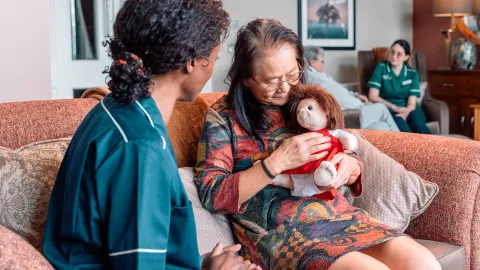Assistive technology for the elderly
Assistive technology can be incredibly useful for older adults to help them live full and safer lives independently. From smart doorbells to screen readers, there’s a device to suit many of the needs of elderly individuals, meaning you don’t have to worry about your loved one having trouble completing tasks.
What is assistive technology for the elderly?
Comprising many assisted devices, this type of technology is designed to aid senior citizens in specific situations. As they age, they’ll find they need to approach tasks in a different way and often have their environments modified to facilitate this.
Assisted devices can be useful in any senior living situation from a private residence to a care home and the specific technology will vary. Some residents will require medication reminders while others will benefit from adaptive switches that can be controlled through the voice or tongue.
How to assess quality in independent living technology?
In trying to define quality in assistive technology, experts have developed the ARCHIE framework, which can be useful when considering aids for your elderly loved ones. It suggests all measures should be:
- Anchored in an understanding of what matters to the user
- Realistic about the nature of any conditions
- Co-creative, evolving solutions with users
- Human, supported through interpersonal relationships
- Integrated, through mutual awareness
- Evaluated to ensure the system is working effectively
Can assistive devices substitute for human help?
While assistive technology can help with day-to-day living, it should not be seen as a replacement for human home care or independent living services. A device can’t replace interpersonal interaction, but can give older adults more confidence and offer relatives peace of mind.
What is the difference between assistive technology devices and assistive technology services?
While assistive technology devices refers to the infrastructure put in place to aid senior living, assistive technology services references the wraparound care. This includes assessing older adults to establish their needs and responding to personal alarms should they be activated.
The importance of assistive technology for the elderly
Many seniors can find the introduction of an assistive product or two a useful intervention, making their lives easier. Such digital technology must be implemented sensitively, however, and with the full buy-in of the elderly person.
Can adapting the homes of older people and providing assistive technology pay its way?
A comprehensive assistive technology service that incorporates devices and monitoring can enable seniors to stay in their own homes for longer, but it’s not always a long-term solution. Eventually, many elderly people need to move into care homes as they require a higher level of human assistance.
Who can benefit from assistive technology?
Most people will benefit from some form of assistive technology as they age and their needs change. The individual requirements of each person must be considered to address specific challenges and integrate the right assistive product for them.
How can technology help us to support older people living with complex conditions at home?
Complex conditions often require a network of solutions to create an ecosystem that works on a large scale. Breaking down diseases such as Alzheimer’s or Parkinson’s into their component symptoms means an assistive technology device can be sought to tackle each one in turn.
When these solutions are all integrated into a senior’s home, they can work together to improve their quality of life. It can mean they are reminded to take their pills and prevented from wandering or covered in case of a fall.
What are some examples of smart technology available to help support older people living in the community?
The types of assistive device worth considering for those living in their own homes include:
- Personal alarms
- Fall alarms
- GPS trackers
- Smart doorbells
- Smart fire alarms
- Water overflow sensors
- Memory aids
- Automatic pill dispensers
- Visual aids
- Screen readers
- Communication devices
Choosing the right assistive technology
The success of assistive technology will depend on making the right choices. Someone suffering from sight loss will have entirely different needs to an elderly person with arthritis or dementia, so it’s important to take individual needs into consideration.
Who is helping you select needed assistive technology?
There are many assistive technology resources and organisations available to help advise you on the best technology solutions for your loved ones. Consider contacting:
- Age UK
- Age Space
- Alzheimer’s Society
Who decides what assistive technology is appropriate for a senior?
The decision about what is the right assistive technology for an elderly person should be a collaborative one. It must include the individual, their loved ones and experts in the field, who can explain the relative benefits of devices and how they might work in context.
What are the different kinds of assistive technology?
Assistive technology falls into five specific categories:
- Mobility
- Communication
- Memory
- Sensory
- Safety
Benefits of assistive technology for the elderly
The benefits of assistive technology for the elderly are wide-ranging and can go beyond their perceived primary purpose. For example, assistive tech to aid mobility may actually have a positive impact on mental health and the reduction of social isolation as seniors have more confidence to complete everyday tasks independently.
Accessibility and mobility support
Ensuring an elderly relative can get around their home and local area is important to ensure they can complete daily tasks and interact with their community to reduce social isolation. Assistive tech can be seen as a preventative measure, which means the risk of falls that could impact long-term care is minimised.
Memory support and cognitive stimulation
As well as being associated with dementia, memory loss is an intrinsic part of the ageing process. Devices in this area can be used for two purposes - the first is to assist a senior in remembering to do specific things like take their pills or feed the cat, while the second is to help stimulate their brain and prevent cognitive deterioration.
Social connection and communication
Communicating with friends and family is important for wellbeing, but can become difficult for the elderly. Assistive technology solutions include accessible mobile phones and speech-generating devices for those who can no longer speak as they once did, perhaps because of a health condition or episode.
Health monitoring
Devices that collect health data on individuals have become commonplace across society and whilst an elderly relative may not wish to share their workouts on social media, having access to this information can be very useful. It can detect sudden changes or the need to tweak medication.
Safety and security
Knowing a loved one is wearing a personal alarm that will alert you if they have a fall or that their home is equipped with an anti-wandering sensor can give you extra peace of mind. Safety and security are two of the primary considerations in senior care and assistive tech can help to provide them efficiently.
Overcoming challenges
Like many changes associated with ageing, implementing assistive tech solutions means overcoming obstacles. It’s important that the emotion of the individual is taken into consideration and that accepting help in this way is not seen as a failure on their part, but a way to help them be as independent as possible.
Affordability
The general assumption is that tech is expensive, but there are a number of ways that assistive technology for seniors is made more affordable. These include VAT exemptions for anyone registered as disabled or with a long-term health condition or by undergoing a care needs assessment by the local authority. A successful person will then be offered free or subsidised devices based on their requirements.
Technological literacy and training
Learning to use tech can be seen as another one of life’s challenges for the elderly and it’s clear patience will be required while they get to understand how to use specific devices. It’s not just up to loved ones to perform this role, as carers and installers can also provide training on new equipment.
Ethical considerations
Among the ethical considerations associated with assistive technology is privacy. Many of the devices available don’t record video or send information anywhere, but others do. Deciding upon the most appropriate measures for a senior means involving them in the process and ensuring they understand and are happy with what’s decided.


